HOW I CAME TO MARRY A YOUNG GUATEMALTECO - Part 3
Here in Guatemala they call themselves Guatemaltecos (Guatemalteca for women) and not Guatemalans. But both are understood. When I came to live here it was a plan for two years, to put this young indigenous woman through her career program and then return to California. I had decided I was DONE with relationships and would never marry again. I tell my guests now I never say never. I also had never even thought about building my own home in a foreign country. But how young is he, this young Guatemalteco? 30 years my junior. And THAT keeps me younger! But it’s a mind-bender to think about the fact that he’s younger than my youngest son, or that I am a tad bit older than his mother! So I avoid thinking about those things, as having one’s mind bending so often in these days is enough to handle given how the whole world is changing so crazily every day.
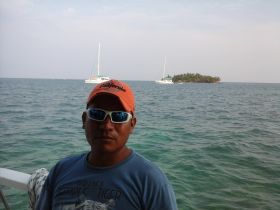
I knew a man from California some years ago who went to Costa Rica with his wife, in their early 50’s, never having even visited there, took everything they could ship, bought land and built a house all inside one year. I visited them and was hugely impressed as they were celebrating the finish of the home, complete with two pools, new kitchen appliances installed, a 360 degree hilltop view in the mountains, their own coffee farm, and now friends with all the local neighbors who worked for them to make it happen. It was unreal, yet didn’t make me want to do it. (I figured the guy must be manic to accomplish all that in one year!)
Back to my own Guatemalteco husband. During the early part of construction of this house Bonnie and I hired a crew to start building a retaining wall. In part we did it that way because we couldn’t get a building permit for the house, which is a story in itself. But our first crew’s manager (not Zaqueo) was an experienced contractor and a good mason. He had shown us photographs of his work designing and building, particularly arches, fountains, walls, alcoves, fireplaces, and all in the Spanish colonial style that is characteristic of Antigua. That was NOT what Bonnie and I had in mind, but clearly he was competent.
And here is where the problem started of people believing that she and I are millionaires. He purchased the most expensive materials of the type we needed, built an enormous work shed to store supplies and much larger than needed, and he hired many men to work as slowly as they could on a wall bigger than we needed, so the job would last longer and keep them employed.
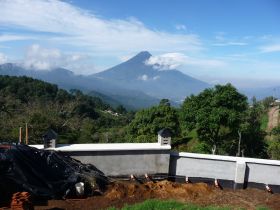
The wall they were building was taller and deeper and wider than it needed to be. When we objected to these plans and dimensions they pushed back and insisted that it was all quite necessary for our protection, to keep our house from sliding down the hill into the next property. When Bonnie and I realized we were not making headway with these responses we decided to fire the whole lot of eleven men and start over. (This is leading up to finding Zaqueo.) The point is that our frustration was building up over a lot of issues, because getting rid of a crew is not easy. And we also got rid of the architect who was supposed to be directing them. These tales will be told in a separate chapter about actual construction.
So around this time of the work crew messing up, Bonnie and I took a sailing trip for a week’s tour and snorkeling on a boat in the Caribbean, out of Rio Dulce. It was a small catamaran, and that week there were eight passengers. The boat had a crew of three men: the cook (Ariel), a first mate (Zaqueo), and captain (Raul). The young cook looked about 12 years old, but I guess he was 16 or 17 and already the father of an infant. He happened to be Zaqueo’s EX-brother-in-law. Zaqueo had been helping the boy learn different kinds of jobs since he was very young. Zaqueo had also started on the boat as cook and had learned to cook from the Captain, Raul. But now as first mate his functions were to free-dive for fish, shuttle guests in the dinghy, help the cook, help the captain, and scold us in English when we messed up, like not flushing the john properly.
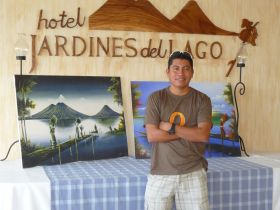
Zaqueo was the only one of the three that spoke English, and his first task when everyone boarded was to sit us all down and read a list of information and rules about the boat and trip. He blushed a lot and apologized for his English, which we all agreed was great and urged him continue. He made some jokes and was generally charming. I thought he was adorable, and in my younger days (I was now 66, the oldest on that trip) I would have flirted with him and encouraged flirting back. I figured he got a lot of that from women while working on this sailboat. But I restrained myself and acted appropriately, as I didn’t believe anything would ever come of my attraction.
During the week long trip he mentioned a couple of times that he was getting tired of the boat and wanted to get away, do something different. He later denied saying this and had no memory of doing so. The last day of the trip the guests were all exchanging email information with each other and asking the crew as well. We took group photos, hugged, and wished each one well in our journeys. When I asked Zaqueo for his email he said he did not have it but would give me his phone number if I promised to call him. I later realized that was just a line he used often with guests. On the bus on the way home to Antigua I pondered what he had said and wondered if he was sincere. I also got the idea to see if he was truly interested in finding a new opportunity. I had observed his work ethics during that week and found him very responsible and efficient, in ways even the captain was not.
The crew were all sick during part of the trip; Zaqueo and Ariel with head colds, and the captain stayed in his cabin with a migraine for a day and a half. Normally both Zaqueo and Raul spent most of the days diving for fresh fish for our meals. The day Raul stayed in his bunk Zaqueo captained the boat himself, as he also had a license for such. He was an excellent worker. The guests were all giving him and Ariel medicines for their colds, trying to imagine how it would be for Zaqueo to free-dive for our fish and conch when having to sneeze and cough. It never kept him out of the water or from doing his job. After cleaning the fish he would help Ariel prepare the meals, serve us, and wash all the dishes before the night was over. Three meals a day. Their work was hard, long hours, and little time to relax.
.jpg)
The week on the boat was not the greatest weather as we had quite a lot of clouds, some rain, not nearly enough sun for our snorkeling ventures, and one night really rough water.
Catamarans are pretty stable, but this night was the roughest of our week. Because the cabins were all full, Zaqueo and Ariel were sleeping on the two open hammocks in the bow. They were made of heavy mesh stretched fairly taught, but over open water. They had sleeping bags, but on this night the waves splashed up over Zaqueo and soaked him. (This is a story I got from Zaqueo well after the trip.) He said he slid over and got into the hammock with Ariel, but not long after another wave came and soaked both of them. A miserable night. But because I was sleeping in a double cabin (which is NOT an actual room but a thin mattress wide enough for two people) by myself, he told me he had been very tempted to ask if he could crawl in alongside me. If he had, I don’t know what I would have thought! My little “room” was right next to the tiny galley, only separated by a curtain in a small doorway, and there was another room/cabin like it on the other side of the galley. Not much privacy for anybody. The next morning the two of them were up as usual at the crack of dawn, brewing coffee for us on the other side of that curtain. It smelled like heaven on a boat. I heard Zaqueo say, “Good morning. Would you like some coffee?” and the cup was offered through the curtain-door. Coming from him it was a very warm welcome. I eventually learned that he is indeed a very warm and welcoming person, to almost everyone, and also later in time, very affectionate toward me.
.jpg) You can see the hammocks in center bow. Cabins are entered at the open hatches.
You can see the hammocks in center bow. Cabins are entered at the open hatches.
I proposed to Bonnie that we might hire Zaqueo to help us with construction. It was not his field, but I pointed out that he spoke some English, worked hard, appeared honest, and was very personable with people. His nature was upbeat, always a smile and often a joking way of communicating. I thought he could help us by ordering supplies (two white women at the construction and hardware stores were not well received, especially since we were obviously millionaires); and he could direct workers, pay their salaries, deal with all the business elements that needed a native to know what’s going on. Also, he could drive the car and do errands. I would first have to teach him drive a car, but I was sure he would be good at it; and he was. Bonnie was not so sure, saying we hardly knew him. But I pointed out to her that we had just spent a week twenty-four seven around him and saw how he works. I asked her if she had ever been on a blind date with a man she had never met before. "Good point," she said and was then willing for us to talk to him about it.
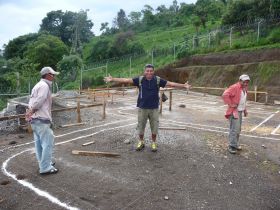 So I did call Zaqueo, I think to his surprise. He had no idea what he might be getting into but was open to discussion and accepted our invitation to visit us in Antigua when he next got time off. I had sensed that his comments about wanting to change jobs were something he did with foreigners traveling on the boat, putting out feelers to move on to things greater than most people can find in Guatemala. His younger brother had gotten an opportunity to sail a yacht to Miami, on a visa obtained for him by his wealthy employer who owned that boat. His visa was for 10 years, so he just stayed on, got construction jobs and gained skills. It is very common for people to have dreams of somehow getting to the United States to have a better life, to send money back to family, to live the American dream. Well, it WAS common.
So I did call Zaqueo, I think to his surprise. He had no idea what he might be getting into but was open to discussion and accepted our invitation to visit us in Antigua when he next got time off. I had sensed that his comments about wanting to change jobs were something he did with foreigners traveling on the boat, putting out feelers to move on to things greater than most people can find in Guatemala. His younger brother had gotten an opportunity to sail a yacht to Miami, on a visa obtained for him by his wealthy employer who owned that boat. His visa was for 10 years, so he just stayed on, got construction jobs and gained skills. It is very common for people to have dreams of somehow getting to the United States to have a better life, to send money back to family, to live the American dream. Well, it WAS common.
Getting Zaqueo to work for us was not a slam-dunk. He was not really sure what we wanted him to do. For one thing, Bonnie and I both thought he was understanding more of our English than he was, as he fudged his way through things. (But so do I when people are speaking Spanish to me, so I don’t fault him for that!) Later we learned what he wanted to think his job was: to be our bodyguard and chauffeur. All the millionaires have bodyguards, of course. And black-windowed Suburbans driven by their chauffeurs and can secure one family member in each vehicle. At some point he even asked us if we would supply him with a gun for our protection. We said no.
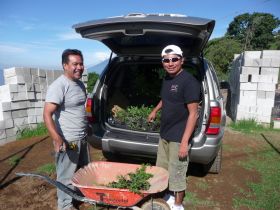 Bodyguards are common in the area where Zaqueo was living and many of his friends were either that or actual drug dealer associates. They were mostly not cartel leaders, but auxiliary people that dealers need along the path between Columbia and Miami, which is all the coastline of Central America. Honduras has many people who have been deeply embedded in the trade. After Zaqueo did come to work for us and he and I became a couple, he started telling me stories of his buddies in Rio Dulce who would invite him to join them at the local restaurant for beers. Some of them he followed in the newspaper enough to learn who was dead, who had been extradited to the US, and who was making big money. He told me these guys were all really very nice people, friends of his for years. Dealers had money to launder so they were spending it on their community. They built churches, fixed bridges and roads, helped schools and ran for local offices. They are respected, trusted, and revered more than the major politicians who take their money through fraud. And there are plenty of those in all Central America. Many of his friends now are not doing as well financially because the dealers have been busted.
Bodyguards are common in the area where Zaqueo was living and many of his friends were either that or actual drug dealer associates. They were mostly not cartel leaders, but auxiliary people that dealers need along the path between Columbia and Miami, which is all the coastline of Central America. Honduras has many people who have been deeply embedded in the trade. After Zaqueo did come to work for us and he and I became a couple, he started telling me stories of his buddies in Rio Dulce who would invite him to join them at the local restaurant for beers. Some of them he followed in the newspaper enough to learn who was dead, who had been extradited to the US, and who was making big money. He told me these guys were all really very nice people, friends of his for years. Dealers had money to launder so they were spending it on their community. They built churches, fixed bridges and roads, helped schools and ran for local offices. They are respected, trusted, and revered more than the major politicians who take their money through fraud. And there are plenty of those in all Central America. Many of his friends now are not doing as well financially because the dealers have been busted.
Zaqueo would earn his pay working on the sailboat, pay his bills and child support for his two children, give his mother money, and then go drink beers with his buddies until his money was gone. The custom at Cheque’s Restaurant was for somebody to buy a round for everyone, then the next guy and the next. The others had more money than he did, but he spent what he had. Around the table sat the drug dealer or auxiliaries, their body guards with their guns openly tucked into their waistbands, and Zaqueo. They would laugh and tell stories and drink beer until they couldn’t any more.
That was his life, until he met me. He said he was tired of being broke and never having money to save. He quit drinking beer when he was working for us and started a savings account. He was sick at the thought of how much money he would have if he had not been drinking all that time. He had managed to build a three room house on his property, little by little, and he felt great satisfaction from having a home where his kids could be with him when he wasn’t sailing. He had dreams of having his own business some day, big enough to pay other people to work for him and to have that business grow bigger. He had listened to many stories of friends who had little education or money but had found a way to prosper to great heights through legitimate businesses
He still follows the newspaper and reads who owns what companies in Guatemala and which men are the richest. He can tell me who the top richest people in the world are. Big dreams. I wondered if he thought I might be a vehicle toward those dreams. Probably.
So we hired Zaqueo, I taught him to drive, and construction proceeded much more smoothly. He brought his friends from Rio Dulce to work for us and took care of many details that we could not.
Thanks for reading!


